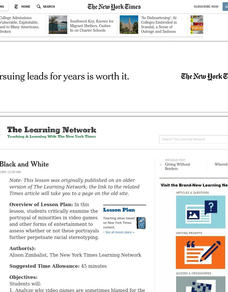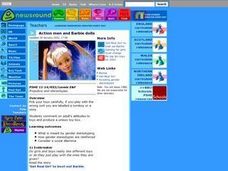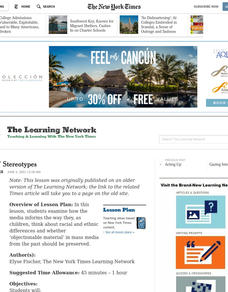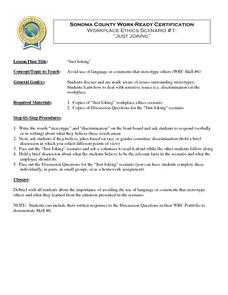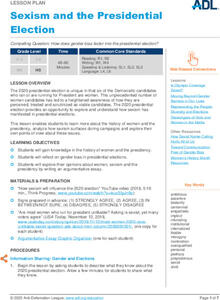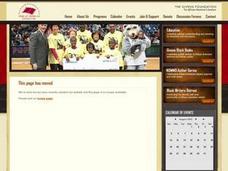Curated OER
Debunking Stereotypes About Muslims and Islam
Learners consider the impact of stereotypes. In this Islam lesson, students discuss the attributes that Islam, Christianity, and Judaism have in common. Learners also discuss stereotypes about Islam and determine how to dispel them.
Curated OER
Beyond Black and White
Students critically examine the portrayal of minorities in video games and other forms of entertainment and assess the role of racial stereotyping. They keep a log of media minority portrayals and respond to their findings.
Facing History and Ourselves
Life for German Youth in the 1930s: Education, Propaganda, Conformity, and Obedience
The German youth faced an onslaught of propaganda when they went to school, thanks to the Nazi regime led by Hitler during World War II. Pupils relate their education experiences to German youth by analyzing primary source readings,...
Curated OER
How Accurate Is It?
Students examine how generalizations can easily be invalid. They qualify generalizations to make them accurate and challenge generalizations made about people, insist on knowing the evidence that supports these, and modify their own...
Curated OER
Stereotype Lesson Plan
Young scholars examine the concepts related to stereotypes. In this stereotyping lesson, students define the word "stereotype" before working in a group to develop stereotype statements. They determine if the statements are fair. They...
Curated OER
Action Men And Barbie Dolls
Learners read and discuss an article about gender sterotyping and adult attitudes about "boy" and "girl" toys. Then they create a unisex toy box for a family friend who is expecting a baby. They give one toy for each of the first 10...
Curated OER
Sufferin' Stereotypes
Examine how the media informs the way your class thinks about racial and ethnic differences. Additionally, middle and high schoolers discuss whether "objectionable material" in mass media from the past should be preserved.
Equality and Human Rights Commission
Learning area 3: Explore a Wide Range of Jobs and Challenge Preconceptions
Squash the notion that certain jobs are meant for a boy or girl with a unit comprised of nine activities. Through discussion, videos, audio clips, worksheets, and readings, scholars examine stereotypes related to specific jobs and...
My Career Space
Just Joking
After reading a workplace ethics scenario regarding an employee who makes racially insensitive comments, your learners will discuss how language that stereotypes others is discriminatory and never "just joking."
Curated OER
CAN WE SWITCH GENDERS OF STORY CHARACTERS?
Analyze characters and stories to identify stereotyping. Learners will examine the concept of character gender to evaluate bias in classroom story books. They are asked to read a story or play and change the gender of the character to...
Anti-Defamation League
Sexism and the Presidential Election
Young historians investigate how sexism impacted the 2020 United States presidential election. They examine media coverage of the six women candidates, engage in a four-corners debate reacting to statements about gender and the...
Curated OER
Investigating Stereotypes
Students study 'stereotype' in literature and life and give examples. they provide examples from life or literature on the origins and impact of stereotypes. they
3. Cite 3 - 5 individual African Americans from literature or life who...
Curated OER
Women's Roles in World War Two
Students explore the various roles of women in the armed forces and their experiences at work. They discuss stereotypes of men and women during World War Two. They read extracts of stories from World War Two in small groups and report...
Curated OER
Prejudice
Students read story, Nipper, and explore and demonstrate understanding of concept of prejudice. Students create definition of prejudice, and describe negative experiences they may have had with people who are different from themselves,...
Curated OER
Sexual Stereotypes in Japan
Students are introduced to the various stereotypes faced by women in Japan. In groups, they discover the types of discrimination women received because of the stereotypes and how they have confronted them over time. They develop their...
Curated OER
Racial Stereotypes in the Media
Students examine how stereotypes function in the media. They discuss the role and nature of stereotypes, watch a clip from the movie, 'Bend It Like Beckham,' and write a response paper about cultural representations in the movie.
Curated OER
Challenging Regional Stereotypes
Young scholars analyze the regional stereotypes that exist in Whales and formulate personal opinions about these views. Students discuss the impact of adjectives used to describe people from different regions of the U.K.
Wadsworth Atheneum Museum of Art
Can Girls Do That?
Why be limited by stereotypes? Young scholars examine a series of works of art, list the different ways boys and girls are represented, and then discuss the common stereotypes found in the works. They then search for art that does not...
Teaching Tolerance
Using Photographs to Teach Social Justice | Exposing Gender Bias
Young sociologists are asked to read two photographs, identifying how the photographer uses point of view, color, pose, light, and shadow to express a stereotype of women or to challenge those stereotypes. Partners then create their own...
National Endowment for the Humanities
Harriet Jacobs and Elizabeth Keckly: The Material and Emotional Realities of Childhood in Slavery
Young historians learn how to make generalizations based on primary sources in a instructional activity that uses the autobiographies of two women born into slavery. The class watches a historical re-enactment of scenes from the lives of...
Learning for Justice
Challenging Gender Stereotyping and Homophobia in Sports
Young learners are asked to challenge what they see as stereotyping and homophobia in sports and the arts. Participants read an article about sexual orientation in the NFL and statements from public figures like Theodore Roosevelt. They...
The New York Times
Collateral Damage? Researching a Connection Between Video Games and Violence
Hook your class into an exploration of and discussion about violence in video games with a cute animal clip and a video game trailer. After a quick discussion about how media can affect mood, class members read a related article and...
Teaching Tolerance
Using Photographs to Teach Social Justice | Exposing Homelessness and Poverty
Photos can capture a complete story in a single image. Class members closely examine a photo of a homeless camp and attempt to read the story told by the picture. They then read the caption for the photograph and compare their notes with...
Anti-Defamation League
Should Washington's NFL Team Change Their Name?
"What's in a name?" Is it irrelevant, as Juliet suggests in Shakespeare's play, or is nomenclature deeply significant? Young scholars weigh in on the debate by examining the controversy over the NFL's Washington, D.C. Redskins. Groups...



